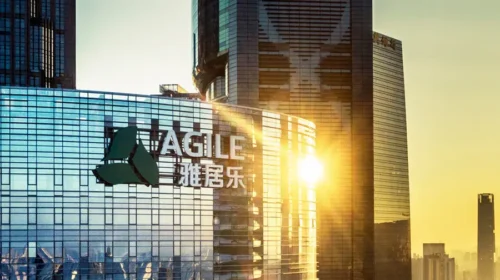A-Living gets tough on debt arrears to claw back into profit

The property manager has cracked down on late payments for its services and taken steps to insulate itself from the debt woes of its embattled parent
Key Takeaways:
- The company has predicted a swing from a deep loss to a profit of up to $56 million for the first half of the year
- A range of measures has been introduced to limit the financial fallout from its indebted parent, the property developer Agile
By Lee Shih Ta
As China grapples with its real estate crisis, companies that manage properties are generally seen as safer assets than the firms that develop the buildings in the first place. But when the businesses are part of the same corporate family, problems can spill over.
A prime example is the relationship between A-Living Smart City Services Co. Ltd. (3319.HK), which supplies services such as rent collection, security, gardening and maintenance, and its parent company Agile Group (3383.HK), a real estate conglomerate mired in distressed debt.
In the first half of last year, A-Living logged a loss of 1.6 billion yuan ($220 million), hit by a heap of unpaid bills related to Agile and affiliated companies. But fast forward a year and the property management arm is moving into the black, with a revised forecast of between 300 million yuan and 400 million yuan in net profit for the six months to the end of June.
Assertive action
The turnaround follows a concerted push by A-Living to sort out the tangle of trade receivables and to avoid further impairment provisions. From the second half of last year, it brought legal actions, introduced stricter contract terms and cracked down on payment delays to reduce its exposure to bad debts.
The property management company also began taking tangible assets from cash-strapped developers in lieu of payments. While these assets are not very liquid, they serve to mitigate the risk of outstanding invoices turning into bad debts on its accounts.
The company also said it had restructured its operations to focus on areas that generate consistent cash flow, such as core property management and urban services, while scaling back its value-added offering.
While many property management companies were looking to expand their client base over the past year, A-Living stood out for focusing on rationalizing and de-risking its business. As a result, cash flow will improve in the first half compared with the same period of last year, the company said in its statement.
Meanwhile, A-Living has also completed a 60 million yuan acquisition of two affiliated companies that were previously subsidiaries of Agile. The firms bring with them revenues from urban services and environmental protection that could bolster A-Living’s operating cash flow going forward.
Rising stock price
The profit guidance went down well with investors. The day after the statement, the stock surged 13.6% to HK$3.55, leaving the company with a gain of almost 30% in the past six months.
It has been a different story for the property management arm of China Evergrande Group (3333.HK). When the real estate conglomerate collapsed, Evergrande Property Services (6666.HK) was plunged into financial crisis, amid reports that 13.4 billion yuan of its funds had been misappropriated. Liquidators will now decide the fate of the property manager. As it faces delisting from the Hong Kong stock market, China Evergrande Group is said to be seeking a buyer for the property management business, whose stock has risen 24% so far this year in anticipation of a possible sale.
Other providers of property services have also been wrestling with pressures from their parent companies.
Shimao Services (0873.HK), while maintaining its core business, is reducing its reliance on its parent while expanding into services for commercial complexes, office buildings and hotels. Despite these efforts, the company posted a loss last year.
With a liquidity crunch at its parent, Sunac Services (1516.HK) has been offloading non-essential operations, including a stake in Guangxi Zhangtai Property Service, to concentrate its efforts on bigger cities. The companies have yet to release first-half results, but their stocks have benefited from a broader rally in the property management sector.
Although investors are showing tentative signs of renewed enthusiasm, the crisis in the sector has not been defused. Agile is still beset by a debt burden that, if exacerbated, could inflict more pain on A-Living. To hedge the risks, the property management firm is seeking third-party business outside of its corporate family, but the scale is still limited. It will take time and resources for A-Living to wean itself off the reliance on its parent company.
The property manager’s forward price-to-earnings (P/E) ratio has not yet returned to pre-pandemic levels. With more third-party business and stable cash flow, it could enjoy some upside potential. But investors would be wise to keep a wary eye on Agile’s debt-related uncertainties, China’s property market policies and the consolidation trends in the industry.
To subscribe to Bamboo Works free weekly newsletter, click here






